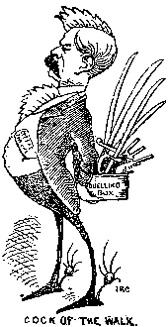From the files of the DIB…Originator of the ‘New Departure’
Published in 18th-19th Century Social Perspectives, 18th–19th - Century History, General, Irish Republican Brotherhood / Fenians, Issue 6 (Nov/Dec 2008), News, Volume 16
Caricature of J. J. O’Kelly from Dublin’s Warder and Weekly Evening Mail, 9 June 1883. (National Library of Ireland)
O’KELLY, James Joseph (1845–1916), Fenian, journalist and MP, was born near Westland Row, Dublin, eldest among five children of John O’Kelly, petty landlord, dray-maker and blacksmith, and his wife (née Lawlor). His three brothers were artists, including the distinguished painter Aloysius O’Kelly, for whom he acted occasionally as agent. James attended school in Dublin and in 1860 was sworn into the IRB; together with his boyhood friend, John Devoy, he made pikes at his father’s forge. When his father died (1861) his family moved to London, where he helped to establish the IRB. In 1863 he joined the French Foreign Legion. After serving briefly in Algeria, he fought in Mexico at the siege of Oaxaca and the battle of Mier. In 1866, when he learned from Devoy that the IRB was planning a rising, he deserted from the Legion and, after enduring great hardship, reached the US and set sail for Ireland.
On arriving in Ireland he saw that the IRB was ill equipped for a rising and opposed the idea. Returning to London, in 1868 he was appointed secretary of the IRB supreme council, and became London correspondent of the Irishman and the leading IRB arms agent in Britain. On 25 February 1871 O’Kelly went to America and was employed as art editor and drama critic of the New York Herald. Shortly afterwards he became the paper’s war correspondent and in 1873 secured an exclusive interview with Cuban guerrillas who were fighting for independence. After advising the rebels on military matters, he was arrested by the Spanish-Cuban army and sentenced to death, but the intervention of Isaac Butt and the US minister to Spain eventually secured his release.
He returned to New York and became special correspondent of the New York Herald. In 1875 he married an American woman who was expecting his child, but they did not live together and she was sent to Paris, where she resided with his brother Aloysius. Later the same year he married Harriet Clarke, a singer and sister of his friend J. I. C. Clarke, but on discovering that he was already married she left him (1876).
O’Kelly became a key figure in Clan na Gael and worked to persuade Devoy that the Irish revolutionary movement (while continuing to prepare for armed revolution) should call for an Irish nationalist parliamentary party to be established at Westminster. After initial hesitation, Devoy agreed with O’Kelly’s advice and published the Clan’s ‘New Departure’ proposals in the Irish press (November 1878). During 1879, as Clan envoy to the IRB, O’Kelly proposed that the Irish revolutionary movement should give military aid to the Zulus in their war against Britain. The following year he tried to persuade the Clan and the IRB to arm the tenants taking part in the Land League agitation in Connacht. The IRB supreme council, however, rejected his proposals. Disillusioned with the Irish revolutionary movement, in the April 1880 general election he stood for parliament on a Land League ticket and was elected for County Roscommon. Thereafter he spoke at numerous rallies and by December 1880 was a member of the League’s central committee. He was arrested in Dublin on 15 October 1881 as part of Dublin Castle’s suppression of the Land League, and held in Kilmainham jail until 2 May 1882.
By the mid-1880s he was effectively the Parnellites’ chief spokesman on British foreign policy. As war correspondent for the Daily News, his detailed reports on the Sudanese war (1883–5), made from behind enemy lines, received much praise in Britain. Secretly, however, he was supporting the Mahdi against the British and attempted to persuade the Clan to give him military assistance. One of the most anti-clerical Parnellite MPs, he believed that only IRB participation in constitutional politics could prevent the Catholic hierarchy from manipulating the Home Rule movement for its own ends. Called before the special commission in 1889, he attracted attention by his candid admission that he was a former revolutionary and by his willingness to defend the actions and ideals of the Fenian movement.
He took Parnell’s side in 1891 and was sent to New York in March 1891 to help collect funds. In the 1892 general election, the anti-Parnellites highlighted his anti-clericalism and the scandal of his bigamous marriage to undermine his campaign, and he narrowly lost his Roscommon seat. He recovered it in 1895 and held it until his death. His parliamentary career, however, was dogged by ill health and financial difficulties, the latter alleviated only by the sale of his brother’s paintings. He was one of the first MPs to support the United Irish League (founded in 1898) and became one of its vice-presidents. During the 1900s he worked as the London correspondent of the Irish Independent. In keeping with party policy, he advocated support for the Allies during the First World War, an action that surprised his old friend Devoy, who maintained that this was the first time the two men disagreed strongly on political matters. He maintained a silence regarding the Easter Rising and died of pneumonia in London on 22 December 1916.
Owen McGee works in the Manuscripts Department of the National Library of Ireland and is a former editorial assistant with the Royal Irish Academy’s Dictionary of Irish Biography.
















